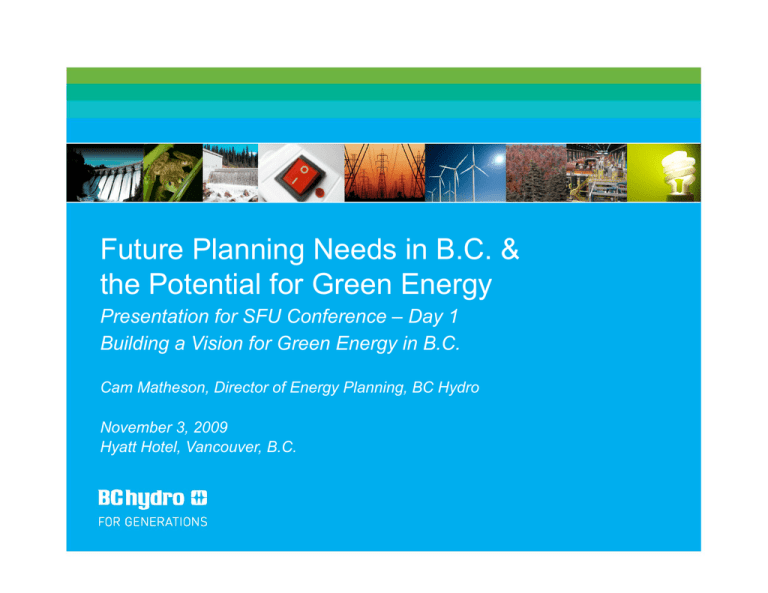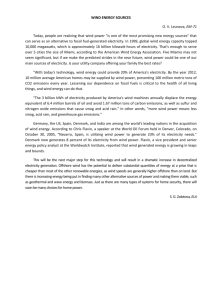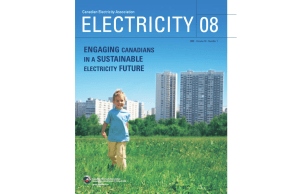Future Planning Needs in B.C. & the Potential for Green Energy
advertisement

Future Planning Needs in B.C. & the Potential for Green Energy Presentation for SFU Conference – Day 1 Building a Vision for Green Energy in B.C. Cam Matheson, Director of Energy Planning, BC Hydro November 3, 2009 Hyatt Hotel, Vancouver, B.C. BC Hydro & Long-Term Electricity Planning • • • • Maintain the low cost and reliability of the system Meet customer long-term needs Implement government policy Sets a course for activities that follow – Demand-Side Management (DSM), Independent Power Producers (IPP) Supply, Capacity Additions • Provides an open and transparent process – Input from customer groups, stakeholders, and First Nations • Engenders long-term public understanding and support 2 The Electricity Gap 3 Firm Energy Capability 4 Capacity Supply 5 Provincial Energy Policy • Achieve electricity self-sufficiency by 2016 • Set an ambitious target, to acquire 50% of BC Hydro’s incremental resource needs through conservation by 2020 • Clean or renewable generation continues to account for 90% of total generation • Zero GHG emissions from coal generation • New electricity generation to have zero net GHG emissions • Existing electricity generation to have zero net GHG emissions by 2016 6 Legislative Context • B.C. Government is implementing the 2007 Energy Plan through legislation and regulations • Special Direction No.10 – Achieve electricity self-sufficiency by 2016 and each year thereafter – Sufficient energy and capacity solely from electricity generating facilities within B.C. – Adverse critical water conditions, meaning BC Hydro’s fleet of hydroelectric generating facilities will contribute, for planning purposes, about 42,600 GWh/year • UCA Amendment Act, 2008 7 Regulatory Context – UCA Amendments • Test for long-term resource plan acceptance is now “public interest” as opposed to “in the interests of persons in British Columbia who receive, or who may receive, service” • In reviewing long-term resource plans under section 44.1, BCUC must consider: – The “government’s energy objectives” – Encourage Public Utilities to: • • • • • reduce greenhouse gas emissions take demand-side measures (DSM) produce, generate and acquire electricity from clean or renewable sources develop adequate energy transmission infrastructure and capacity in the time required to serve persons who receive or who may receive service use innovative energy technologies – How the utility intends to reduce the demand for electricity by pursuing costeffective [DSM] measures 8 Implementing the Energy Plan: Longer Term Considerations Planning Assumptions • • • • • Special Direction 10 means self-sufficiency by 2016 Mid-load forecast Critical water is the base (42, 600 GWh) 90% of new supply is clean and renewable 50% DSM by 2020 Impacts on System • • • • • • No market reliance in our plans Large hydro storage increasingly used to integrate renewables Potential for more spilling Large to enormous surpluses (depending on water supply year) Need for more transmission to move this surplus Increased risks: DSM, IPP attrition, responsiveness to rate increases 9 Implementing the Energy Plan: Longer Term Considerations • New transmission infrastructure – Congestion relief – Strengthening interties • Call terms and conditions – Limiting exposure to freshet energy – Limiting exposure to high cost non-firm energy – Valuing ability to integrate and shape • New capacity additions – Revelstoke/Mica additions – Site C ? • Contingency resource plans – Manage key uncertainties 10 Environment & Long-Term Electricity Planning • Energy Plan provides policy guidance on many environmental issues – LTAP incorporates many policies either through analysis or as constraints • Consistent with BCUC Resource Planning Guidelines, the LTAP includes an assessment of expected future environmental regulatory costs – GHG offsets – BC Carbon Tax • 2006 IEP/LTAP also included high level air, land and water impacts – BC Hydro is assessing if there is time to revisit for next LTAP 11 Questions? Please visit our website for more information, on BC Hydro and Electricity Planning: www.bchydro.com/iep 12








